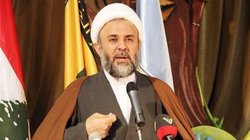 A top official from the Lebanese Hezbollah resistance movement says Iran's precision missile strikes at US military bases in Iraq in retaliation for the assassination of Lieutenant General Qassem Soleimani, the commander of the Quds Force of Iran’s Islamic Revolution Guards Corps (IRGC), shattered Washington’s invincibility myth.
A top official from the Lebanese Hezbollah resistance movement says Iran's precision missile strikes at US military bases in Iraq in retaliation for the assassination of Lieutenant General Qassem Soleimani, the commander of the Quds Force of Iran’s Islamic Revolution Guards Corps (IRGC), shattered Washington’s invincibility myth. RNA - “Iran, by bombing the bases, exposed the American arrogance and put an end to the US invincibility myth. It demonstrated that it stands … prepared for any confrontation. The blood of Lt. Gen. Soleimani marks the end of American presence in Iraq and the region, so the United States no longer has a future in the region,” Nabil Qaouk, the deputy head of Hezbollah's executive council, said at a memorial ceremony held in Lebanon’s southern town of Khiam on Monday.
He further noted that the Iranian attack on Ain al-Assad air base marks the start of a response, which will not conclude until the full withdrawal of US troops from Iraq and West Asia.
On Sunday, Hezbollah Secretary General Sayyed Hassan Nasrallah said the Iranian missile strikes sent the message that all American targets in West Asia are within the range of Iranian missiles.
“This attack was also a message to the Zionist entity… Let stupid [Israeli Prime Minister Benjamin] Netanyahu know the wrong spot he has put his entity in,” Nasrallah said in a televised speech broadcast live from the southern Lebanese city of Baalbek as he addressed his supporters.
He added, “Look at the faces of the US leaders… Do they look like victorious faces?”
The Hezbollah chief then slammed mainstream Arab news networks for being far too pro-US over their attempts to underreport the Iranian strikes and the extent of damage caused.
The US military carried out a terrorist operation at Baghdad’s international airport last Friday, assassinating Lt. Gen. Soleimani, along with his companions, including Abu Mahdi al-Muhandis, the second-in-command of Iraq’s PMU.
Both commanders were admired by Muslim nations for eliminating the US-sponsored Daesh Takfiri terrorist group in the region, particularly in Iraq and Syria.
The US assassination has drawn a wave of condemnation from officials and movements throughout the world, and triggered huge public protests across the region.
Early on January 8, the IRGC targeted the US-run Ain al-Assad air base in Iraq’s western province of Anbar after launching a wave of attacks to retaliate the assassination of Lt. Gen. Soleimani.
The IRGC has called for a complete withdrawal of US troops from the Arab country, asserting that it would not differentiate between the US and Israel in retaliating against the assassination of the Iranian national hero
“We warn US allies providing bases for the [American] terrorist army… that any country serving as the origin of bellicose and aggressive attacks in any form against the Islamic Republic of Iran will be targeted,” an IRGC statement read.
The strike came as no surprise since Iran had vowed to take a “harsh revenge” in the wake of the US act of terror.
Leader of the Islamic Revolution Ayatollah Seyyed Ali Khamenei later said Iran’s missile strike on US bases in Iraq was just “a slap.”
"The talk of revenge and such debates are a different issue. For now, a slap was delivered on their face last night," Ayatollah Khamenei said in remarks broadcast live on the national television on January 8.
847/940